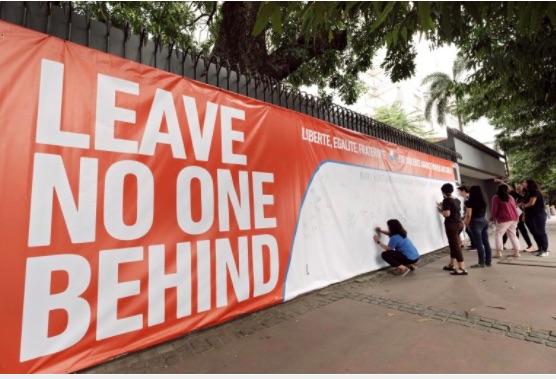. WOMEN’S EQUALITY .
A blog by Marie O’Reilly* for Ms Magazine Blog
When social norms are upended by violence—including relations between women and men—constitution reform presents an opportunity to transform power dynamics in a society. Rewriting a country’s constitution is a frequent step on the path toward peace, and is a particularly important entry point for women to address their historic marginalization and have a say in the future of their societies.

UN Women / Creative Commons
Yet among the 75 countries that undertook constitution reform in the wake of conflict or unrest between 1990 and 2015, women made up only one in five constitution drafters.
As individuals, women play myriad roles in peace and conflict—victims and perpetrators, peace activists and politicians—and they often embody many of these identities at once. But a new study from the nonprofit Inclusive Security, where I serve as research director, shows that when women do participate in constitution making, they consistently advocate for constitutional provisions that advance gender equality.
In Kenya, this meant equal rights and non-discrimination in marriage, divorce, property and citizenship—as well as a commitment that no more than two-thirds of any elected body could be of the same gender. In Rwanda, it meant a guarantee that women would occupy at least 30 percent of seats in parliament.
These kinds of gender equality provisions help to ensure that women can continue to influence public policy after the constitution-making process ends.
They also help lay a foundation for peace.
(Article continued in the right column)
Do women have a special role to play in the peace movement?
(Article continued from the left column)
There are many drivers of conflict, but scholarly research suggests a strong relationship between gender equality and peace. This is particularly true for women’s participation in politics and the durability of peace after war. A study of 58 conflict-affected states between 1980 and 2003 found that when no women were represented in the legislature, the risk that a country would relapse into war increased over time. But when 35 percent of lawmakers are women, the risk of relapse is near zero. The causal direction is not always clear, but working for both equality and peace at once appears to be in everyone’s interest.
Beyond advocating for their own rights in the constitutional text, our research showed that women tended to advance peace-building as part of the constitutional process. Across eight case studies, women frequently bridged acute political and religious divides to advance their gender equality agenda, modeling for other policymakers how communities affected by conflict can collaborate and develop consensus on priority issues.
Women’s civil society groups also consistently led outreach initiatives to broaden societal participation and help cement the social contract as it was being created.
In the Philippines, women’s organizations engaged former combatants, students, academics and religious, tribal and business leaders to develop draft provisions on topics such as indigenous peoples’ rights, the justice system and policing.
Of course, it takes much more work to turn constitutional provisions into tangible change. In Rwanda, women now have the highest rates of parliamentary representation in the world. In Kenya, on the other hand, the parliament has failed to enforce the two-thirds principle. But as a foundational legal text, a constitution provides a framework for advocacy and further legislation. Kenyan women took the streets last January to protest their president’s failure to name women to at least one-third of his new cabinet, and their banners referenced the constitutional provisions that he was violating. Two Kenyan rights groups have taken the issue to the High Court.
If done right, constitution-making lays the groundwork for civil contestation, rather than violent confrontation. But its potential to transform conflict into democratic deliberation depends, in part, on who gets to participate.
* Marie O’Reilly is director of research and analysis at Inclusive Security.